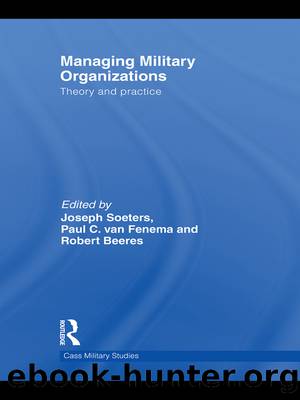Managing Military Organizations by Soeters Joseph;C.van Fenema Paul;Beeres Robert;

Author:Soeters, Joseph;C.van Fenema, Paul;Beeres, Robert;
Language: eng
Format: epub
Tags: Economics, Finance, Business & Industry
Publisher: Taylor & Francis Group
Published: 2010-02-05T00:00:00+00:00
Moral professionalism and the military
A great deal has been written in the last few decades on the professionalization of armed forces, and some, for example those of Israel and Australia (Robinson 2008:7), have included professionalism in their value lists. However, not surprisingly, one key elementâthat a professional is more loyal to his profession than to his organization and colleaguesâis less developed in the military. Nevertheless, most authors today seem to agree with the view that the military profession is, indeed, a profession.
However, if being moral, and thus also moral professionalism, involves the ability to put oneself in other peopleâs places, this presents a potential difficulty for the military. Most manifestations of military ethics and other professional ethics, respectively, are fairly consistent as to whose interests are most important, though it seems that they point in different directions. Whereas, for instance, the values of the medical profession and medical ethics are about patients and medical care, and not about how to associate with colleagues, the gist of the codes, oaths and values as currently formulated in most militaries is undeniably somewhat one-sided in that they mainly pay attention to military effectiveness, and the needs of the organization and colleagues. This ethic took shape, however, in a time in which contact with the local population played a lesser role.
The predicament facing most militaries today is clear, however. Armed forces are institutions that flourish on the loyalty among colleagues and to the organization, something that is often called âthick moralityâ (Walzer 1994) and is somewhat at odds with what a âregularâ professional ethic entails. Those who deploy troops, on the other hand, are politicians who increasingly further a universalistic, âthinâ form of morality that stresses justice and human rights, ironically enough often regarding conflicts that are a result of people allowing themselves to be led by a thick morality. So, where the military works with rather narrow circles of loyalty because that is what military effectiveness on most accounts demands, politicians tend to take the widest possible circle as their starting point.
Where lies the loyalty, however, when thin and thick conflict? It has been noted by several authors, though probably foremost by sociologist Martin Shaw in The New Western Way of War (2005), that, when it comes to losses, civilian casualties among the local population are deemed less important than Western military losses. It is perceived that way by both the militaries and the populations at large in the West, hence the emphasis not only on maximum force protection, but also on ways of delivering firepower that are relatively safe for Western military personnel, yet sometimes less so for the local population. This risk-transfer will generally remain within the limits of the âdouble effectâ clause of the just war tradition in that civilian casualties are an unintended side-effect of legitimate attacks on military targets. It possibly falls short, however, in the light of Michael Walzerâs restatement of that clause in his Just and Unjust Wars, holding that the actor has to make efforts so as to avoid civilian casualties as much as possible, âaccepting costs to himselfâ (1992:155).
Download
This site does not store any files on its server. We only index and link to content provided by other sites. Please contact the content providers to delete copyright contents if any and email us, we'll remove relevant links or contents immediately.
The European History Highway: A Guide to Internet Resources by Dennis A. Trinkle Scott A. Merriman(494)
The Seven Wonders of the Ancient World by Michael Denis Higgins(477)
European Security in a Global Context by Thierry Tardy(470)
European Security without the Soviet Union by Stuart Croft Phil Williams(469)
The Routledge companion to Christian ethics by D. Stephen Long Rebekah L. Miles(458)
Hudud Al-'Alam 'The Regions of the World' - a Persian Geography 372 A.H. (982 AD) by V. V. Minorsky & C. E. Bosworth(399)
Gorbachev And His Generals by William C. Green(391)
Get Real with Storytime by Julie Dietzel-Glair & Marianne Crandall Follis(390)
Tibetan Studies in Comparative Perspective by Chih-yu Shih Yu-Wen Chen(385)
Governance, Growth and Global Leadership by Espen Moe(381)
Hyperculture by Byung-Chul Han(378)
CliffsNotes on Fitzgerald's The Great Gatsby by Kate Maurer(360)
The Oxford History of the World by Fernández-Armesto Felipe;(354)
How Languages Are Learned 5th Edition by Patsy M Lightbown;Nina Spada; & Nina Spada(353)
The Egyptian Economy, 1952-2000 by Khalid Ikram(352)
Oral Poetry and Narratives from Central Arabia: The Poetry of Ad-Dindan : A Bedouin Bard in Southern Najd (Studies in Arabic Literature, Vol 17) (English and Arabic Edition) by P. M. Kupershoek P. Marcel Kurpershoek(343)
The Oxford Handbook of the Incas by Sonia Alconini(333)
Europe Contested by Harold James(319)
The Hutchinson Dictionary of Ancient and Medieval Warfare by Peter Connolly John Gillingham John Lazenby(305)
